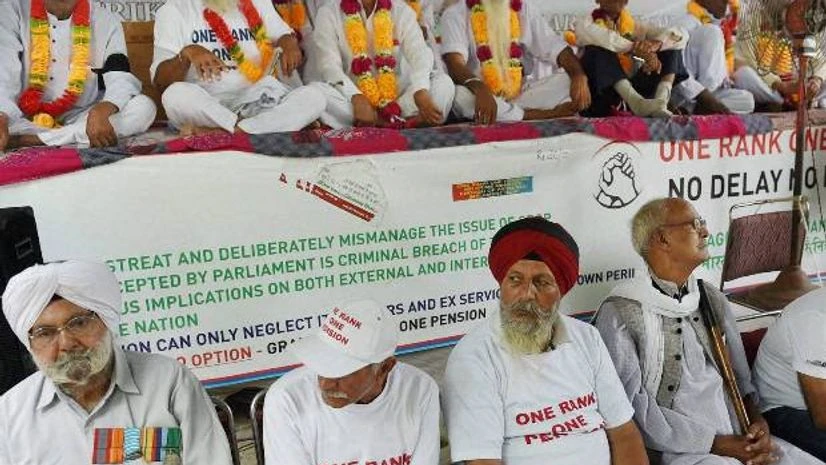On Saturday, four days before Diwali, the government has reached out to the agitating ex-servicemen community, by issuing a notification implementing one rank, one pension (OROP).
The government says the award will benefit 2.5 million ex-servicemen, and involve an annual outgo of Rs 8,000-10,000 crore. “Notwithstanding the financial constraints, true to its commitment, the present government has issued the government order to implement the OROP in true spirit,” the defence ministry release says.
On September 5, defence minister Manohar Parrikar had announced the grant of OROP, but ex-servicemen groups rejected that, saying it fell short of their demands.
The chief of United Ex-Servicemen League (UESL), Major General Satbir Singh, identified seven major objections to Parrikar’s award. These included non-award of OROP to personnel who had retired voluntarily; the “equalization” of pensions, or adjustment of old and new pensions only once in five years, instead of annually; fixation of pensions as the average of pension drawn in the year 2013, instead of pension drawn on March 31, 2014, as the ex-servicemen demanded; making OROP effective from July 1, 2014, instead of March 31, 2014, depriving ex-servicemen of three months’ pension; fixing pension in each grade as the average of that grade, instead of the maximum as demanded; granting successive pay commissions the right to fix pensions, which ex-servicemen fear might result in OROP gains being temporary; and constituting a one-member judicial commission to regularise anomalies in pension within six months, instead of a five-member committee that would remove anomalies within one month.
It is unclear if ex-servicemen groups would be satisfied by the current notification, which ignores at least five of these demands.
While apparently granting OROP to pensioners who had taken voluntary retirement in the past, it excluded those who chose to leave the military in the future. The notification says: “Personnel who opt to get discharged henceforth on their own request… will not be entitled to the benefits of OROP. It will be effective prospectively.”
That means the government has conceded OROP to those voluntary retirees who are there to fight for it, but not to those who are not there yet, i.e. those who opt for premature retirement in the future.
The government has partly conceded the demand for a five-member committee to adjudicate on pension anomalies. But it has granted the committee six months, instead of the month demanded by ex-servicemen groups.
In the other five aspects, the government has stuck to its guns. A defence ministry release says: “Pension of the past pensioners would be re-fixed on the basis of pension of retirees of calendar year 2013 and the benefit will be effective with effect from 1.7.2014 (July 1, 2014).” This is what Parrikar announced on September 5.
On the amount of pension, the notification says: “Pension will be re-fixed for all pensioners on the basis of the average of minimum and maximum pension of personnel retiring in 2013 in the same rank and with the same length of service… Pension for those drawing above the average shall be protected.”
On the key “equalization” demand, the government has maintained its position, that “In future, the pension would be re-fixed every 5 years”.
An ex-serviceman influential in the agitation argues: “This means that for one year we will have OROP and then, for the next four years, we will keep slipping backwards until pensions are equalised again after a five-year interval. This is a fake OROP”.
The way the award will affect individual ex-servicemen will become clear later. The government announcement says: “Detailed instructions along with tables indicating revised pension for each rank and each category, shall be issued separately… directly by Pension Disbursing Agencies.”
The core principle of OROP, as enunciated by Defence Minister Manohar Parrikar on September 5, is: “OROP implies that uniform pension be paid to the armed forces personnel retiring in the same rank with the same length of service, regardless of their date of retirement. Future enhancements in the rates of pension would be automatically passed on to the past pensioners.”
The ex-servicemen community, traditionally supporters of the Bharatiya Janata Party (BJP), has been alienated from the party over the course of a high-visibility public agitation that began on June 5. On Friday, the ex-servicemen had upped the ante, announcing they would return medals awarded for military service and gallantry.

)
